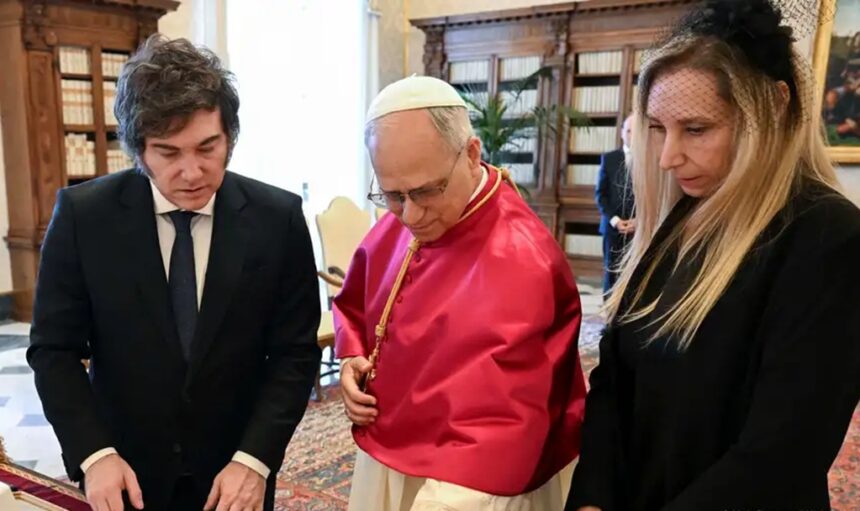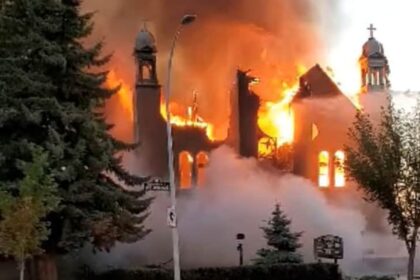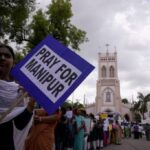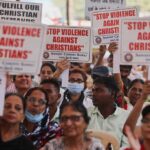VATICAN CITY – Pope Leo XIV welcomed Argentine President Javier Milei to the Vatican on Saturday, marking an important moment for relations between Argentina and the Holy See. Vatican representatives described the meeting as “cordial” and said both sides wanted to improve ties and discuss key national and global concerns.
Their conversation covered economic development, reducing poverty, and supporting peace. Still, this visit also highlighted the sharp differences between Milei’s economic policies and the Catholic Church’s social doctrine, as well as the history of tension between Milei and Pope Francis’ predecessor, Pope Francis.
The meeting was held in the Apostolic Palace, where Pope Leo XIV, the first American pope, greeted the president warmly in Spanish: “Muy buenos días, señor presidente, bienvenido.” After their private talks, Milei met with Cardinal Pietro Parolin, the Vatican’s Secretary of State, and Monsignor Mirosław Wachowski, Undersecretary for Relations with States.
The topics included areas of shared concern like the economy and poverty, although the Vatican’s statement did not give many details. During the visit, Milei invited Pope Leo XIV to visit Argentina, and the pope reportedly agreed, raising the prospect of a papal trip to Argentina soon.
Francis Never Visited Argentina
This invitation stands out because Pope Francis, though the first Latin American pope, never returned to Argentina during his 12 years as pope from 2013 to 2025. Born Jorge Mario Bergoglio in Buenos Aires, Francis was a significant figure for many Argentines, but many were left wondering why he did not visit his homeland.
His absence was often linked to deep divisions in Argentine politics, especially the split between those for and against Peronism, the movement started by Juan Perón. Francis was often accused of favouring Peronist ideas, even though he denied it, and faced criticism from conservatives like Milei, who once called him “the representation of evil on Earth” and a “filthy leftist” for speaking out on social justice.
Since taking office in December 2023, Milei, who calls himself an anarcho-capitalist, has introduced strict economic policies to tackle Argentina’s soaring inflation, which hit 211% in 2024, and to address poverty affecting more than 40% of the population. His government has devalued the currency by over half, stopped funding public works, and made deep cuts to state support for the arts and science.
While these steps brought Argentina its first budget surplus in 12 years, they have made the recession worse, with consumer spending dropping by 20% and poverty rising to 52.9% by late 2024. Many people have suffered as a result, with around 200,000 construction workers losing their jobs and universities struggling to keep running.
Vatican Archbishop criticized Milei
Milei’s belief in the free market is at odds with the Church’s view that the state should protect the weak and promote fairness. The Catholic Church has long argued for policies that help the poor, a message stressed by Pope Francis, who often spoke out against unchecked capitalism.
The difference in ideology came to light again with comments from Buenos Aires Archbishop Jorge Ignacio Garcia Cuerva, who joined the Vatican meeting and has criticized Milei for lacking empathy and not recognizing the hardship faced by ordinary Argentines.
The past conflict between Milei and Pope Francis adds another layer to this meeting. Before becoming president, Milei had used harsh language about Francis, calling him an “imbecile” and even comparing him to the Antichrist.
After his election, Milei changed his tone, holding a more positive meeting with Francis in February 2024 during the canonization of María Antonia de Paz y Figueroa, Argentina’s first female saint.
That meeting, which included a warm hug and a joke from Francis about Milei’s haircut, suggested a new beginning. Milei also attended Francis’s funeral and Pope Leo XIV’s inauguration, showing a clear effort to repair relations with the Vatican.
Pope Leo Facing Challenges
Pope Leo XIV, who took over in May 2025 after Francis’s death, faces his challenges, including budget problems and ongoing debates about Church teachings. His reception of Milei points to a practical approach, focusing on open discussion rather than division.
During their meeting, Milei gave the pope a copy of Friedrich Hayek’s The Fatal Conceit, a book that sums up his libertarian beliefs, showing again the clear differences between his economic ideas and the Church’s position.
The arrangement for Pope Leo XIV to visit Argentina could mark a new chapter in relations. While Francis avoided Argentina to steer clear of its political rifts, Leo’s decision to accept Milei’s invitation suggests a fresh stage in how the Vatican engages with the country.
For Milei, hosting the pope may help boost his image abroad as critics at home question his economic choices. For the Holy See, this visit is a chance to connect with a country where 62% identify as Catholic, even as church attendance drops.
With Argentina facing economic struggle and growing unrest, the meeting between Pope Leo XIV and President Milei shows the ongoing tension between economic policy, politics, and faith. While the talks point towards better relations, the deep divide between Milei’s reforms and the Church’s mission to support the disadvantaged remains.
Observers will be watching closely to see how their relationship develops, especially if Pope Leo XIV’s visit to Argentina takes place.






